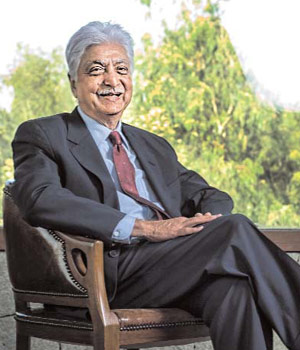Azim Premji
This is a collection of articles archived for the excellence of their content. |
Contents |
As an industrialist
He has not just made Wipro India's third-largest software exporter, but is also one of the country's foremost philanthropists, having given away over Rs.23,000 crore worth of shares to a trust. His son Rishad may join the company's board next year.
He has been a champion for education through the Azim Premji Foundation, which runs the Azim Premji University and the Institute of Assessment and Accreditation to improve educational standards.
Wife: His wife Yasmeen Premji designed the Azim Premji Foundation building in Bengaluru. It has no air conditioning but still remains cool.
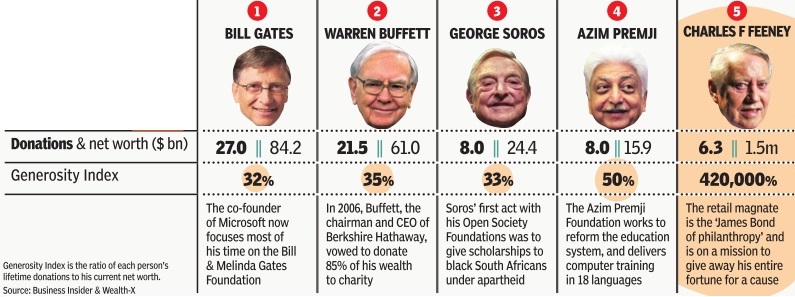
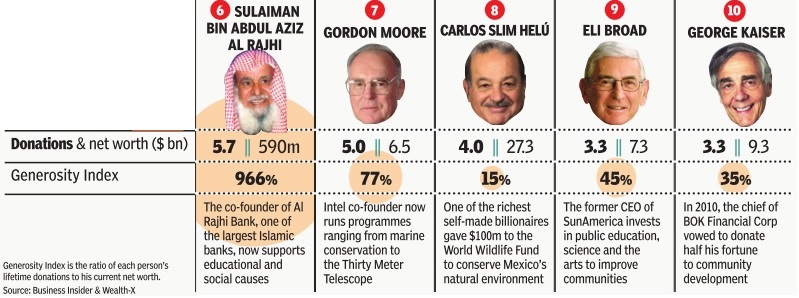
The man
June 7, 2019: The Times of India
Premji, IT’s marathon man, to call it a day after 53 years
Son Rishad Will Succeed Him As Chairman
Bengaluru:
An era is ending at Wipro, and for the Indian IT industry. Azim Premji, who transformed the cooking oil company his father started in 1945 into a $25 billion (Rs 1.8 lakh crore) global IT powerhouse, will retire as executive chairman on July 30.
Premji, along with Infosys’s N R Narayana Murthy and TCS’s F C Kohli, is regarded as a pioneer of the Indian IT industry, which today has revenues of $177 billion, employs more than 4 million people and is the country’s biggest export business.
Premji will be succeeded by his elder son, Rishad Premji, a Harvard Business School and London School of Economics graduate, who joined the firm in 2007 in its financial services business division. Rishad, 42, has played several roles in the company, and is currently the chief strategy officer.
The Premji family owns 73.9% of the shares in the company. So Rishad’s succession was almost inevitable.
In a statement, Premji thanked “generations of Wiproites and their families for their contribution towards building” the company to what it is today. “It has been a long and satisfying journey for me. As I look into the future, I plan to devote more time to focus on our philanthropic activities,” he said.
For many years, Premji has avoided the public glare, and left all public announcements and interactions related to the company to the CEO and other top executives. His own public engagements were mostly related to his philanthropic activities, most prominently in education.
Premji to be on Wipro board as non-executive director
Premji’s philanthropic commitments are unprecedented in India. In March this year, he announced an increase in this commitment by Rs 52,750 crore, taking his overall commitment to his endowment to a humongous Rs 145,000 crore (67% of Wipro shares). This makes his foundation one of the biggest in the world. He was the first Indian to be a signatory to The Giving Pledge initiative started by Microsoft founder Bill Gates and billionaire investor Warren Buffett, under which billionaires commit at least 50% of their wealth to philanthropy. The Premji family continue to have voting rights on the entire 73.9% stake they hold in Wipro. But the family benefits in financial terms from only a maximum of 7% of the stake.
Premji will continue to serve on the Wipro Board as non-executive director and founder chairman, a company release said. He will also remain the chairman of Wipro Enterprises, the $2 billion entity that focuses on FMCG (with products like Santoor soap and Smartlite bulbs), and infrastructure engineering. He will also continue to chair the board of the medical devices joint venture, Wipro-GE Healthcare. On Rishad, Wipro independent director Ashok Ganguly said his understanding of the global technology industry, strong strategic orientation and diverse leadership experience make him the right person to guide the company.
Humility, philanthropy
Asha Rai, June 7, 2019: The Times of India
LIVING SMALL, GIVING LARGE
His Hallmark: Absolute, Unwavering Integrity And Single-Minded Focus
Azim Premji, currently India’s second richest man (after Mukesh Ambani) with a wealth of $21-billion, was so embarrassed when he was named by Forbes as the country’s richest man, back in the heydays of India’s IT services — late 90s — that he didn’t take any congratulatory calls. It fell on Ashok Soota, who ran the IT services business that made Premji a billionaire, to talk about his boss and what made him special. Many, many things make ‘Azim’, as he’s fondly called by his friends, special. Integrity tops the list, modesty comes a close second. His philanthropy, ability to spot an opportunity, whether in business or people, focus, professionalism, the list is long.
He practised corporate governance before it became a fashionable jargon. He braved a five-and-half month strike for sacking an employee for submitting fake bills, in 1984. His closest associates aver that his belief in principles and ability to stand by them never faltered in the five decades he ran Wipro and built it from a small family-run vegetable oils and soaps business to the multi-billiondollar software-to-soaps enterprise it is today.
Anurag Behar, CEO of Azim Premji Foundation (which owns 67% of the economic interest of Wipro Ltd) says that as a young engineer 30 years ago, the only reason he joined Wipro was “because of the reputation Wipro had for uncompromising integrity. In the mid-to-late 80s this was a strange reputation for a private business to have. After 25 years of being both in front-line functions and in the CEO post, I can vouch that he has built this company with absolute, unwavering integrity.” Premji’s tales of thriftiness are legendary. And so is his giving. He was the first Indian to sign the Bill Gates and Warren Buffet’s ‘Giving Pledge’ to donate 50% of his wealth in his lifetime.
What doesn’t immediately pop up when talking of this reticent man is his ability to nurture talent. By one count, there are over 200 CEOs/CFOs and CXOs among Wipro’s alumni. Many became entrepreneurs themselves. Soota went on to found two companies: MindTree and later, Happiest Minds. Subroto Bagchi and N Krishna Kumar were the co-founders of Mind-Tree. Suresh Vaswani, a former co-CEO, became head of Dell Services, Som Mittal of Digital India.
His perseverance can be seen from the fact that while he legendarily dropped out of Stanford with a semester left to return to India after the sudden demise of his father, he finished his degree — a BSE in electrical engineering — about 10 years ago.
Dileep Ranjekar, a close associate of Premji’s of over four decades, say there are three things that set him apart: Intensity, professionalism, and middle class values.
“He has this rare intensity to make things work — a single-minded focus to get things done as prioritised by him or the organisation,” says Ranjekar who was Wipro’s long-time HR head before starting Premji’s philanthropic initiatives and is also CEO of Azim Premji Foundation. He also says, “I have not seen an ownerprofessional like him. In the 43 years I have worked with him he never sent a single recruitment related-recommendation.” Ranjekar adds, “His frugal living, lack of pomposity and practice of middle-class values had an enormous impact on the organisation’s values.”
Premji’s friendship and rivalry with N R Narayana Murthy-led Infosys, spurred both companies and made them the poster boys for Indian tech on the global arena. Murthy, in fact, had met Premji when the latter was looking for someone to head his tech business. Premji was then focused on building a hardware business wanting to take advantage of IBM’s exit from India. Murthy was clear his calling was IT services. The two parted to the benefit of the Indian tech industry as both went onto build multi-billion dollar companies.
When Rishad, Premji’s Wesleyan, Harvard Business School-educated elder son, joined the business, it was always clear that he would be on the ownership track at Wipro, headed for the chairman’s office, and not on the executive track towards a CEO post. Tariq, his younger son, is involved with Premji’s philanthropic work.
His exit from the chairman’s role might give Premji more time with his Smith College educated, author-wife Yasmeen and grand children, Rohaan and Rhea. But considering that he lives on Wipro campus, he might not be too far away from the company in body or spirit.
Career
1945-2000
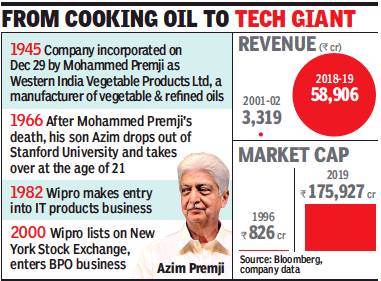
From: June 7, 2019: The Times of India
See graphic :
Azim Premji’s career: 1945-2000
1966-2019

From: June 7, 2019: The Times of India
See graphic :
Azim Premji’s career: 1966-2019
2019: retirement
June 7, 2019: The Times of India
Premji, IT’s marathon man, to call it a day after 53 years
Son Rishad Will Succeed Him As Chairman
Bengaluru:
An era is ending at Wipro, and for the Indian IT industry. Azim Premji, who transformed the cooking oil company his father started in 1945 into a $25 billion (Rs 1.8 lakh crore) global IT powerhouse, will retire as executive chairman on July 30.
He will turn 74 a week before that, and would have led Wipro for 53 years when he retires, having taken over the company on his father’s death in 1966.
Premji, along with Infosys’s N R Narayana Murthy and TCS’s F C Kohli, is regarded as a pioneer of the Indian IT industry, which today has revenues of $177 billion, employs more than 4 million people and is the country’s biggest export business.
Premji will be succeeded by his elder son, Rishad Premji, a Harvard Business School and London School of Economics graduate, who joined the firm in 2007 in its financial services business division. Rishad, 42, has played several roles in the company, and is currently the chief strategy officer.
The Premji family owns 73.9% of the shares in the company. So Rishad’s succession was almost inevitable.
In a statement, Premji thanked “generations of Wiproites and their families for their contribution towards building” the company to what it is today. “It has been a long and satisfying journey for me. As I look into the future, I plan to devote more time to focus on our philanthropic activities,” he said.
For many years, Premji has avoided the public glare, and left all public announcements and interactions related to the company to the CEO and other top executives. His own public engagements were mostly related to his philanthropic activities, most prominently in education.
Premji to be on Wipro board as non-executive director
Premji’s philanthropic commitments are unprecedented in India. In March this year, he announced an increase in this commitment by Rs 52,750 crore, taking his overall commitment to his endowment to a humongous Rs 145,000 crore (67% of Wipro shares). This makes his foundation one of the biggest in the world. He was the first Indian to be a signatory to The Giving Pledge initiative started by Microsoft founder Bill Gates and billionaire investor Warren Buffett, under which billionaires commit at least 50% of their wealth to philanthropy.
The Premji family continue to have voting rights on the entire 73.9% stake they hold in Wipro. But the family benefits in financial terms from only a maximum of 7% of the stake. Premji will continue to serve on the Wipro Board as non-executive director and founder chairman, a company release said. He will also remain the chairman of Wipro Enterprises, the $2 billion entity that focuses on FMCG (with products like Santoor soap and Smartlite bulbs), and infrastructure engineering. He will also continue to chair the board of the medical devices joint venture, Wipro-GE Healthcare.
On Rishad, Wipro independent director Ashok Ganguly said his understanding of the global technology industry, strong strategic orientation and diverse leadership experience make him the right person to guide the company.
Philanthropy
2016-21: harity arms get ₹18,000cr=
Avik Das & Shilpa Phadnis, July 13, 2021: The Times of India
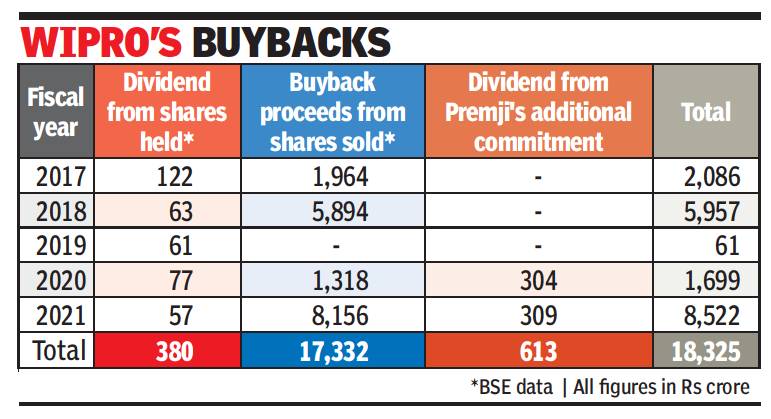
From: Avik Das & Shilpa Phadnis, July 13, 2021: The Times of India
Azim Premji’s philanthropic arms have received over Rs 18,000 crore in dividends and buybacks over the past five years. And the numbers are rising since 2019, when Premji committed that the economic benefits that come from 67% of Wipro shares — by way of dividends, sale of shares, etc — will go to his endowment. Premji, directly and indirectly, controls 73% of Wipro’s shares.
Two of his philanthropic arms, Azim Premji Trust and Azim Premji Philanthropic Initiatives, are classified as part of the promoter group, and hold 10.2% and 0.27% of the company respectively. While the dividends over the years were sizable, what added to the corpus was the four buybacks that Wipro did in the last five years.
In the fiscal years ended 2017, 2018, 2020, and 2021, the two philanthropic arms received Rs 1,964 crore, Rs 5,894 crore, Rs 1,318 crore, and Rs 8,156 crore respectively from the buybacks in those years. In 2020, almost 86% of the Rs 9,500-crore buyback went directly to the two shareholding philanthropic arms. It looks like most of the shares tendered for the offer came from these arms, since their shareholding fell from 13.6% to 10.5% between FY20 and FY21. However, they received around 13% of the Rs 10,500-crore buyback done in August 2019. It’s not clear if they would also get a part of the benefit from the shares tendered by other Premji-controlled entities, based on Premji’s commitment earlier that year.
Premji set up the Azim Premji Foundation in 2000. Its objective was to facilitate the universalisation of primary education. Azim Premji Philanthropic Initiatives, set up in 2014, provides financial support through multi-year grants to not-for-profit organisations that work for the most disadvantaged and marginalised people. The foundation has over1,000 employees and has field institutes in over 40 districts across six states and one Union territory. It has made significant commitments towards tackling the health and humanitarian crisis arising from the Covid pandemic.
Premji was recently ranked 12th among the world’s greatest philanthropists of the past 100 years in a report by EdelGive Foundation and Hurun India.
